



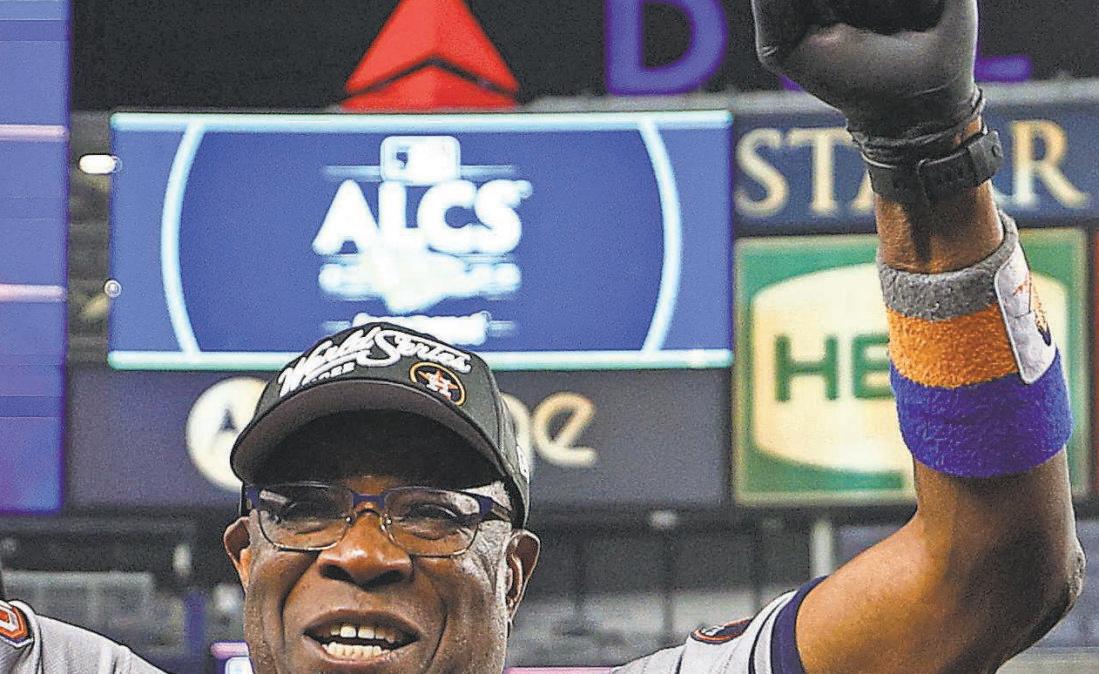


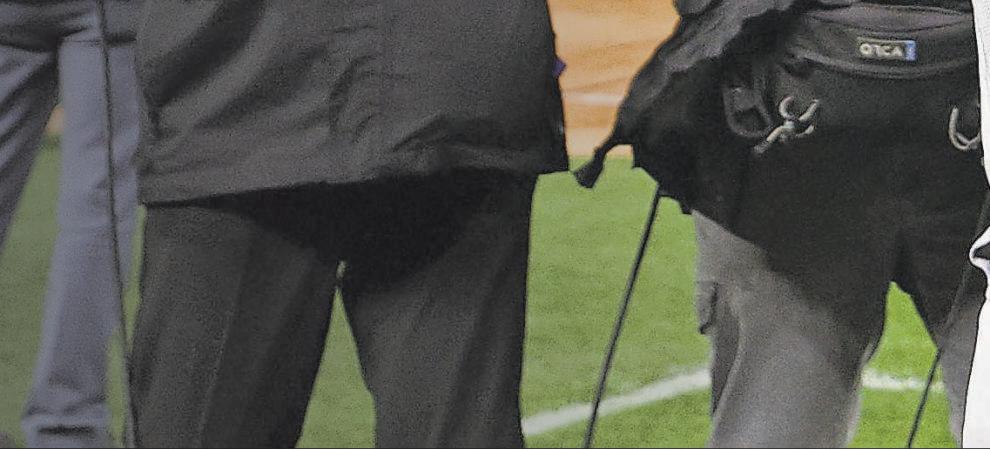



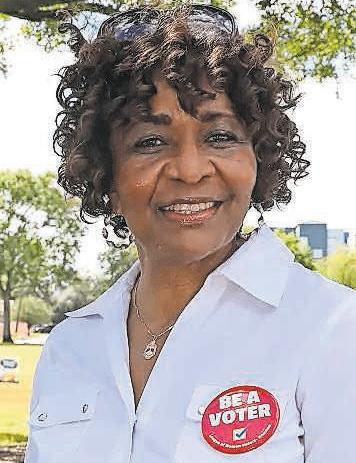

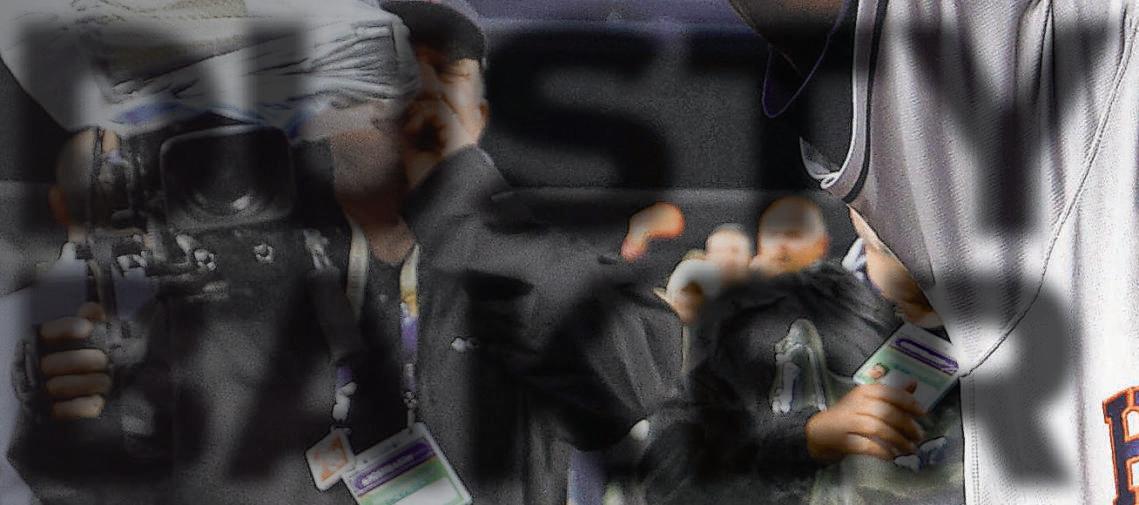















Not surprising to anyone, a Russian court denied the appeal of Houston native and WNBA star Brittney Griner who was hoping to have her nine-year prison sentence reduced. Griner, who appeared virtually, addressed the hearing, saying, “I beg that the court takes in all of the stakes that [were] overlooked in the frst court and reassess my sentence here.” Gri ner added that her time in the Russian prison, separated from her family, has been traumatic. In a very real and very sad way, Griner is symbolic of all Black women. She’s an undeniable superstar, as all Black women are. Griner is a master at her craf, the best on her job, just as all Black women are. And she’s being abused for all the world to see, yet no one seems to be doing a damn thing about it. Just like all the Black women we know. We all have got to do better by Brittney and by all Black women.
Y’all, this is an all-hands-on-deck election. Afer the Jan. 6 coup attempt to discount the power of the Black vote that put Biden and Harris into the White House, the anti-democratic forces who wanted to make Donald Trump a king (read dictator for life) literally pushed and passed hundreds of voter suppression laws that are on the books right now. Tat’s to squash your vote and your voice. Now, they’re running election deniers for every seat imaginable, especially those state election administrator seats. Why? So, they can “ofcially” declare the winner of the 2024 election
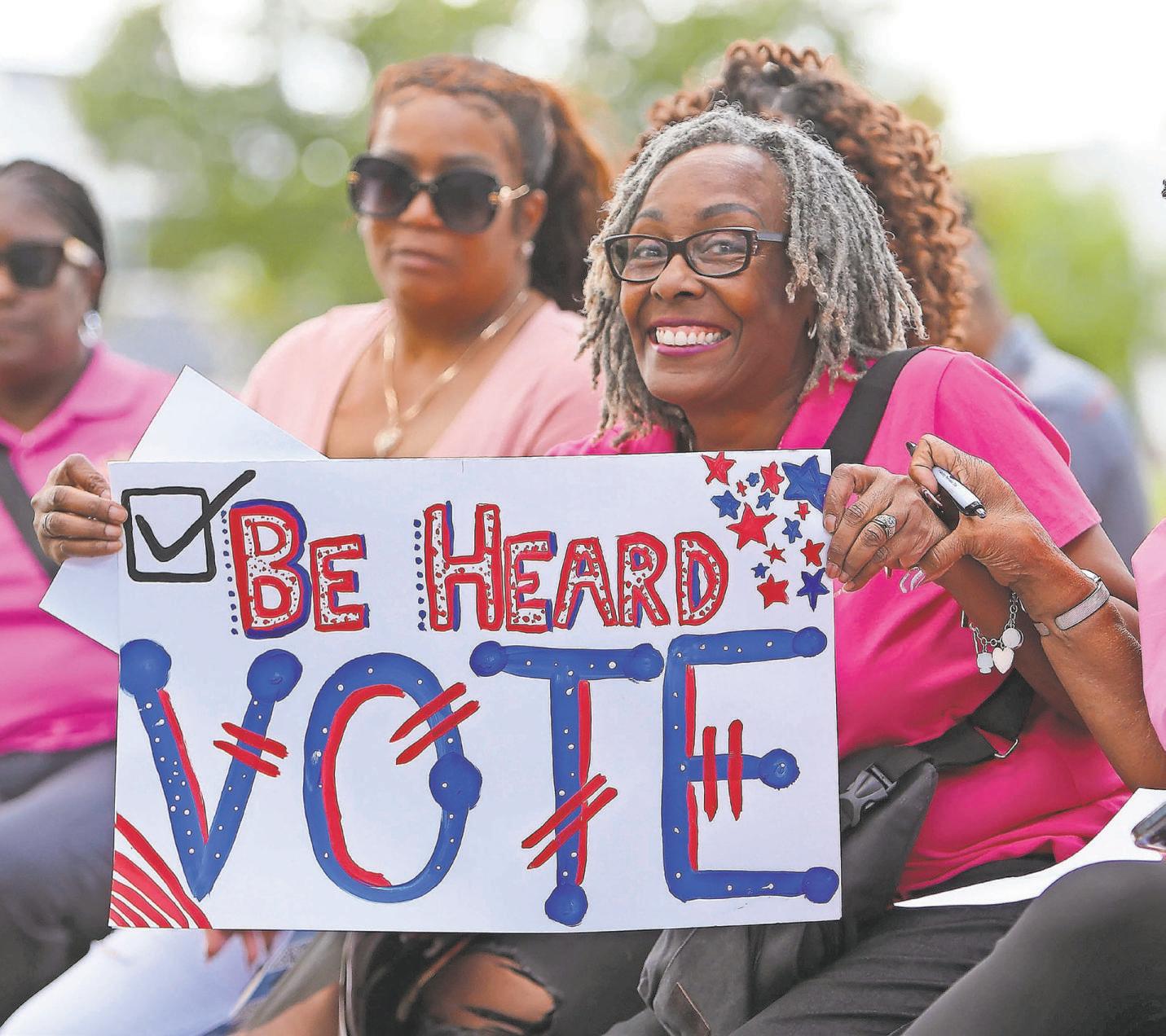
regardless of what the voters say. So, in a very real sense, the failed Jan. 6 coup DIDN’T FAIL! It’s still in efect, and can only be stopped by us voting. And the best way to do that is by voting early (now until Nov. 4). Tere are several reasons why voting early is the way to go (read about them in this paper). But sufce it to say, we have an opportunity to beat back the Jan. 6 white nationalist, insurrectionists. Let’s use it.
Hervis Rogers, the brother charged with voter fraud when he waited in line for hours to vote during the March 2020 presiden tial primary, and was fnally able to cast his vote, has had those charges dropped. You may recall that the federally-indicted Texas Attorney General, Ken Paxton, ordered Rogers’ arrest in July 2021 on charges that Rogers voted while on parole. Te move by Paxton was viewed by many as theater for those looking high and low across the country for what researchers have said is a literally non-existent voter fraud issue. Te Texas Court of Criminal Appeals told Paxton to stand down, and the charges were dropped. Te bigger issue here is Rogers was unaware he was ineligible to vote, and saw voting like he saw the two jobs he worked—as opportunities to rehabilitate his life. Paxton, however, saw an opportunity for something else.
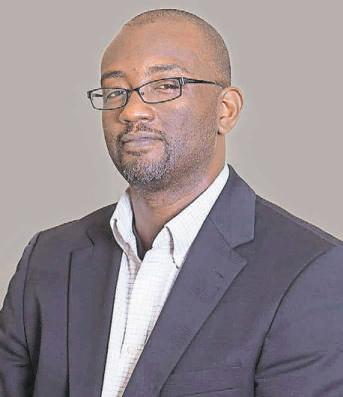
• Learn about the Top 10 Best Colleges in Texas.
• Financial freedom by spending your debt away? Learn more.
• Te Dos and Don’ts of lash extensions.

Houston and Harris County leaders have collaboratively called a recent move by Texas Secretary of State John B. Scott an attempt to suppress votes.
e Texas Secretary of State’s Office, in a letter submitted days before the start of early voting for the 2022 midterm election, informed Harris County it will send a team of inspectors and election security trainers to observe and help administer the Nov. 8 election in the state’s largest metropolitan area.
Houston-area leaders responded by requesting that the US Justice Department send federal monitors to watch the inspectors in an attempt to halt potential voter intimidation.
State Senator Borris Miles responded immediately to Scott’s announcement.
“ e Texas Secretary of State (SOS) sent a letter to the Harris County Elections Administrator’s Office (EAO) outlining plans that will intimidate voters and election workers for the upcoming November Election,” said Miles. “ e timing of the letter, a week before early voting, is incredibly suspect and could potentially disrupt the
entire election process.”




Miles said the SOS letter failed to provide key details regarding the Office of Attorney General’s (OAG) “task force,” including the rules and guidelines they will be operating by. Ken Paxton, the state’s Attorney General, has been indicted for felony securities fraud charges, among other things.
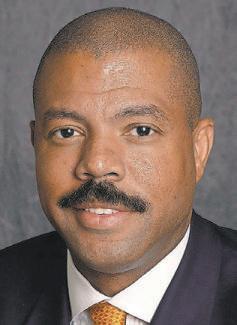
“There are so many unanswered questions like, whether the task force will be allowed to enter polling sites, whether they will be allowed to talk to voters trying to cast a ballot and actions the task force will be able to take in Harris County. Just their presence alone will have a negative impact on the election process and voter turnout,” added Miles.
A letter released and signed by Houston Mayor Sylvester Turner, Harris County Attorney Christian Menefee
and County Judge Lina Hidalgo, said “ ese actions appear designed to chill voters’ trust in the election process in Harris County, and to disrupt and intimidate local election workers as they execute their duties to ensure the 2022 election is ‘smooth and secure,’ as the Texas Secretary of State described the 2020 election at the time.”

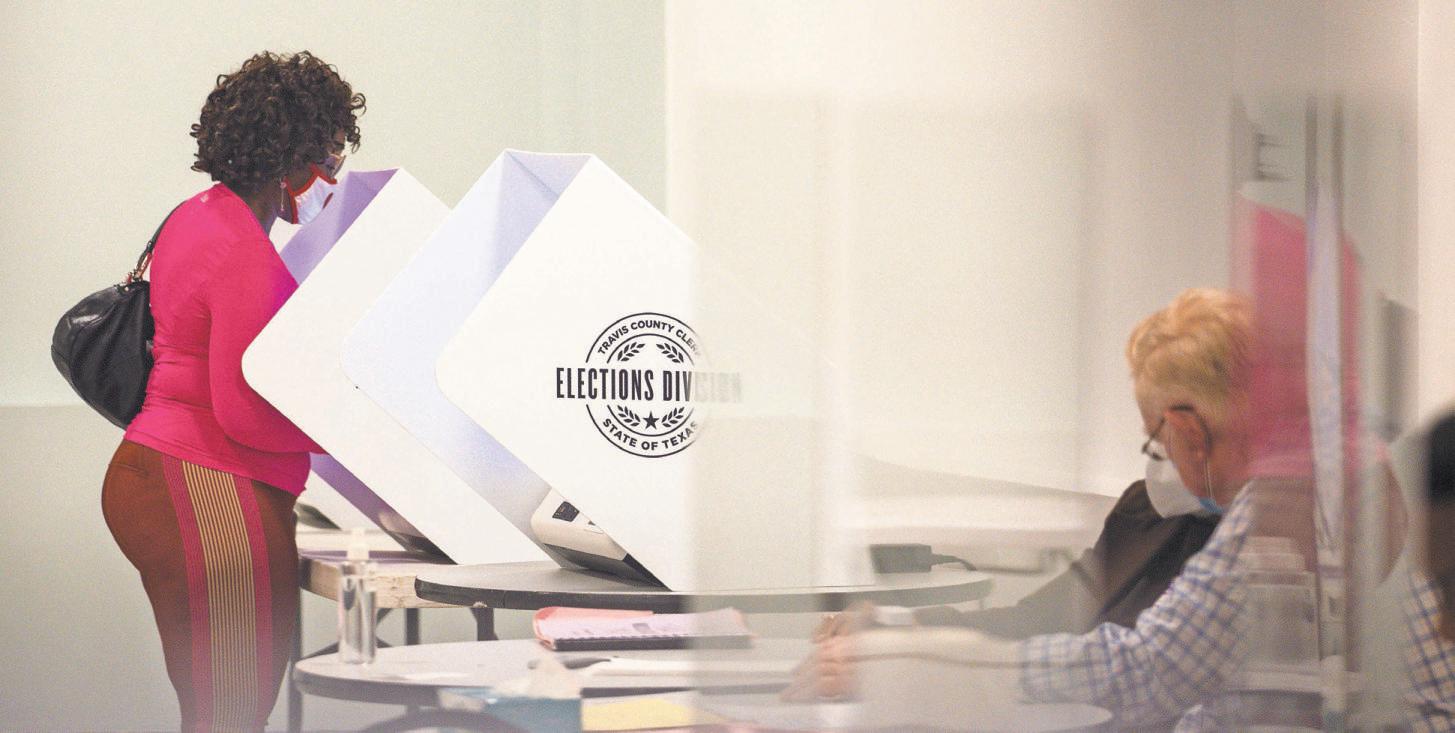
“ at is an obviously very dangerous development in the midterm election here in Texas,” said James Slattery, the senior supervising legislative attorney for the Texas Civil Rights Project, a nonprofit that advocates for voting rights. “ ere is no obvious purpose to this letter other than a preemptive strike by state officials to discredit publicly the results of the 2022 election here in Texas, even before a single person has gone to the polls.”
Scott based his decision on alleged Nov. 2020 election minor discrepancies which would be found in any audit of a large county, and others that exceeded technology in Harris County in 2020. e previous Secretary of State found no significant improprieties with the 2020 election.
It’s been a long, drawn-out fight, but residents of Houston’s first historically Black community are claiming victory in a debate that will allow them to stay in Fourth Ward.
Houston City Council has approved an amendment to its redistricting plan that keeps Freedmen’s Town, located in historic Fourth Ward, in District C. It had been part of a plan to be incorporated into neighboring District H, which has seen a population decline, compared to other districts – such as District C.
“We are grateful that when it comes to how the numbers were worked out, we were able to find a solution that, for once, in the last 50 years, doesn’t seek to impact Freedmen’s Town first, instead of seeking alternative solutions,” said Zion Escobar, executive director, Houston’s Freedmen’s Town Conservancy.
In the early days of Houston, the city did not have neighborhoods — rather, Houston was divided into six wards by the city-planning brother duo John Kirby Allen and Augustus Chapman Allen in the 1840s. At the time, the land in the Fourth Ward was seen as undesirable because it was prone to flooding thanks to its close proximity to a bayou. e area primarily became home to formerly enslaved Black people who found they were unwelcome in other areas of the city.
e proposal to move Freedmen’s Town from District C to District H initially was approved to correct a numerical imbalance. District C, located in Fourth Ward, including parts of Houston’s Midtown District, is among the most densely populated in the city and has overgrown, according to city officials. District H, meantime, was among three districts to have lost constituents, including Districts I and J. By law, the most populous district cannot have more than 10% additional residents than the smallest district.
“Our precinct happens to have 5,000-plus residents. Because of the changes in density over the last 10-15 years, we have more density than most other places in District H or the nearby area,” Escobar said, adding community members understood the numbers game at play and what needed to be done, solely from that perspective.
Residents voiced concerns about the proposal and why they felt it was a setback for Freedmen’s Town.
“Momentum is everything when it’s taken 50 years to try to get positive momentum in the right direction towards the rebirth of Freedmen’s Town. We’re in Houston’s first Heritage District. It took five to seven years to get that ordinance done, to get that passed,” Escobar said.
Students in Houston’s largest school district recorded their worst scores in nearly two decades in a national assessment test conducted by the U.S. Department of Educa tion, mirroring a nationwide trend and illustrating how the COVID-19 pandemic has stunted children’s aca demic development.
Results from the National Assess ment of Educational Progress (NAEP) show that math and reading scores among the 500,000-plus fourth- and eighth-graders who were tested this year declined in almost all regions of the country and in almost all states compared to 2019, the last year the study was conducted and the year before the onset of the pandemic. None of the 50 states saw signifcant improvements compared to 2019.
Te decreases in math scores were the sharpest they have been since the initial assessment in 1990. Reading scores did not dip as drastically but still fell to 1992 levels.
“Let me be very clear: these results are not acceptable,” Education Secre tary Miguel Cardona told the Asso ciated Press.
Houston ISD, the largest school district in Texas with 276 schools and nearly 197,000 students, was one of four urban districts in the state and 26 overall to participate in the biannual assessment, known as the “nation’s report card.” A sample of 5,400 HISD students from 107 campuses were
tested, according to the district.
HISD’s overall scores for eighthgrade math and reading were the lowest they had been since 2003 –the first year HISD participated in the biannual assessment – while the district recorded its worst scores yet in fourth-grade math and reading.
HISD’s overall scores in math were similar to the average scores for other public-school students in large cities, while its performance in reading was lower than average.
Nationally, this year’s assessment found that achievement gaps wid ened along racial lines since the start of the pandemic. Black and Hispanic fourth-graders saw larger declines in scores than their white counterparts.
Tere have been similar trends in HISD, where the scores of Black and Hispanic students were more greatly impacted than those of white students in eighth-grade reading as well as in fourth-grade reading and math. His panic students account for more than 61% of HISD’s student population, which is more than 22% Black and less than 10% white.
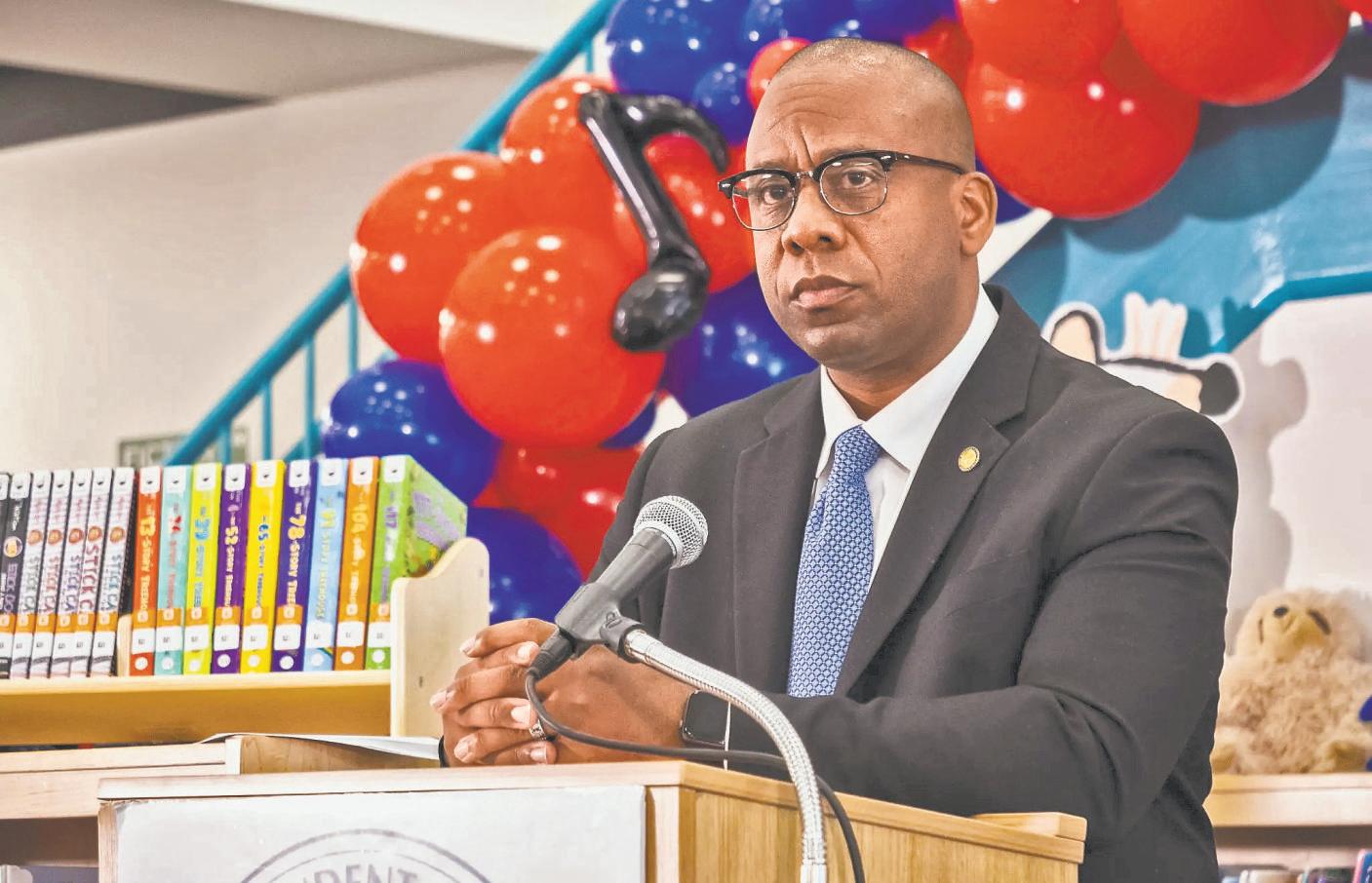
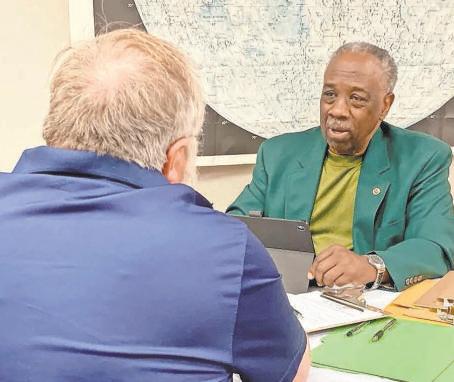
Congressman Al Green and congressional caseworkers spent several hours at Houston’s Mancuso neighborhood library in the Sunnyside neighborhood to provide residents with help on federal assistance issues.
Dozens of individuals were able to communicate directly with caseworkers regarding social security, IRS, Medicare and veterans’ assistance. Representatives from the Small Business Administration, U.S. Department of Housing and Urban Devel opment and student loan ofcials were all on hand. A federal appeals court recently suspended the student loan debt forgive ness program, the frst legal challenge to President Biden’s plan, and several people had questions about that.
“Tere are people in this country who believe that if you allow the opposition party to do something positive that that will help the opposition party to stay in ofce,” Al Green said. “And so as a result their mission is to just block everything.”
Tere is $1.6 trillion in outstanding student loan debt for more than 45 million borrowers. So far, more than 8 million loan borrowers have completed their student loan forgiveness applications.
“Tis case has been stymied in a lawsuit that was fled by six states that are arguing that the program would hurt state based loan companies that manage some federal loans themselves,” Green said. “While I see this as a specious argu ment, the court obviously difered with me.”
Although this is the frst event of its kind hosted by Green, the congressman plans to hold several more.
“Tis is the frst area and the frst we decided to embrace here because of the concentration of low- income earners,” Green added. “Te most important reason is so that people will know that there’s a resource available to them if there’s a federal agency that they’re having some complications with. It’s important for people to have access to information.”
“Tis year’s NAEP scores are fun damental to understanding how the COVID-19 pandemic has affected our nation’s education system in these core subjects at a pivotal period in our students’ education journeys,” HISD superintendent Millard House II said in a news release from the district. “Tis is why it continues to be import ant that we provide the necessary aca demic and non-academic supports to help every student succeed as detailed in our fve-year strategic plan.”
HISD saw declines across the board in the percentages of its students per forming at or above basic achievement levels as defned by the NAEP.
Remote learning associated with the pandemic also has exacerbated inequities between higher-perform ing students (those at or above the 75th percentile) and lower-perform ing students (below the 25th percen tile). Surveys that accompanied this year’s test showed that, nationally, higher-performing students had more help from their teachers and better access to quiet spaces as well as computers and tablets.
“It is a serious wakeup call for us all,” Peggy Carr, the commissioner of the National Center for Education Statistics, told the Associated Press. “... Tis is a very serious issue, and it’s not going to go away on its own.”
The League of Women Voters (LWV) of Houston, Texas Children’s Hospital and the Houston Defender Network recently joined forces to encourage the community to exercise the highest civic privilege we have as citizens – voting.
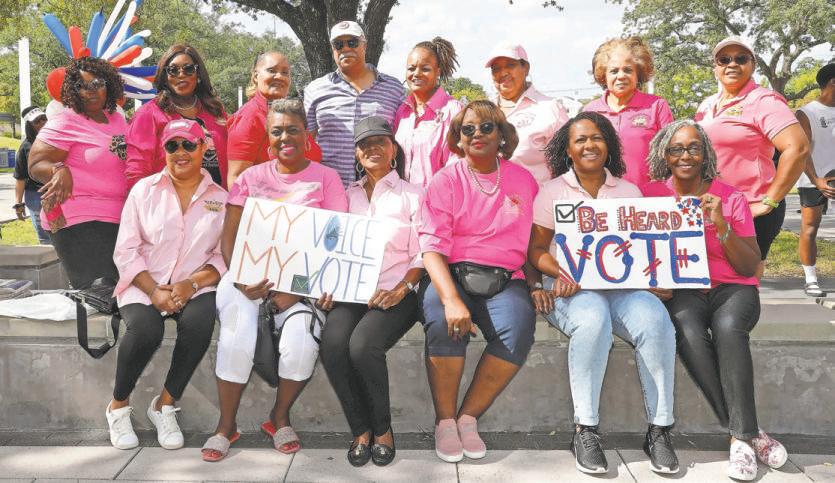
e Early Voting Rally held at Houston’s historic Emancipation Park was hyped from beginning to end, with attendees representing all manner of organizations, faith institutions, fraternities and sororities. And all were in lockstep about the seriousness of the mission that lie before us — a November midterm election that demands the public’s full attention and participation by showing up at the polls.
“We can effectuate change not only by being here, but also by voting,” said Annie Johnson Benifield, president of LWV of Houston. “We’re going to go out in numbers and show the impact of communities of color on the electoral process in this state of Texas and Harris County.”
A consistent theme shared by attendees was the seriousness of the November election.

“We believe that this is a critical time in the history of our nation, for our state and for our city,” said Rev. Dr. Angela Raven-Anderson, director of the Wheeler Avenue Baptist Church Social Justice Ministry. “We think that it is important that people understand that their vote matters, that their voice is their vote. And we need for people to come out and elect officials to
legislate on behalf of our people.”
Along with the Defender Network, TCH and LWV, community partners included Wheeler Avenue Social Justice Ministry, Black Women of Greater Houston PAC, Greater Houston Black Chamber, Houston Area Urban League, Metro, NAACP Houston Branch, Top Ladies of Distinction, Houston Metropolitan Baptist Ministers Conference, City of Houston and the student government associations of Texas Southern University and the University of Houston.
“My hope is that we’ll show up and show out,” said Jenell Berry, president of the National Coalition of 100 Black Women Houston Metropolitan Chapter, when asked for her prediction of 2022 voter turnout. “If we don’t get out and vote our voices don’t count. Our voices need to be heard.”
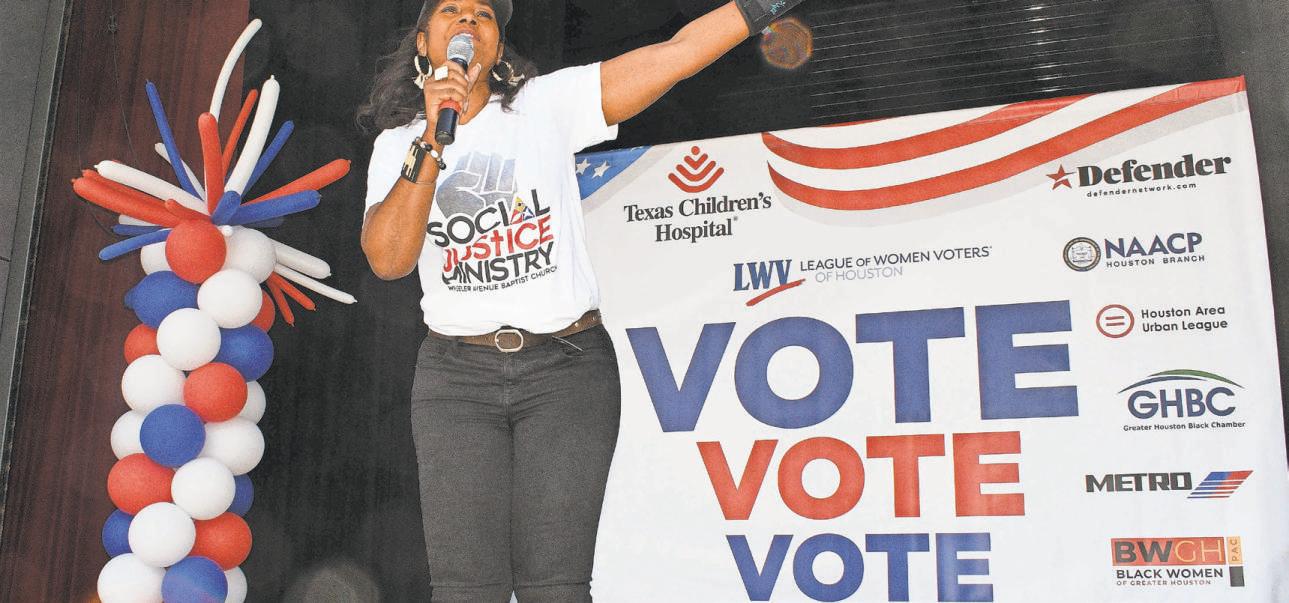
Sonceria “Sonny” Messiah Jiles, CEO and publisher of the Defender, broke down the importance of the gathering and the voting therea er in three sentences: “We elect the people. e people
make the laws. e laws impact our lives,” she said.
Messiah Jiles shared other reasons why this election is vitally important: protecting our children from a “whitewashed” education that removes people of color from history books; securing access to healthcare; and protecting our liberties, including instituting gun reform and protecting women’s rights to choose.
Joshua Martin, president of the UH Student Government Association, provided the crowd with words of warning about the seriousness of the issues on the line this November, but le attendees with words of hope regarding next month and beyond.
“We’re going to make it known that this is just the beginning,” said Martin. “Because after this, we have citywide elections coming up in 2023. We have a presidential election coming up in 2024. And we want to make sure that we are educated students, that we’re going to get out there to vote and that this is just the beginning,”
 By Aswad Walker
By Aswad Walker

I won’t waste your time telling you all the reasons why this November’s midterm election is so critical (although it really, really is). I’ll just share with you what I believe to be the top five reasons to vote early.
No. 1: Avoid the Madness –Early voting, along with being insanely convenient, allows you to avoid long voting lines, that you already know are being made longer by Republican lawmakers who have closed down a gazillion former voting locations in Black and Brown neighborhoods. They bank on us being so frustrated by long lines that we choose not to vote. And then, there are the GOP-funded and bred “poll watchers” whose job it is to harass and intimidate as many people as possible in hopes that we’ll turn around and not vote. There’s also the avoidance of showing up to the polls without all your necessary IDs to vote, and then being out of time to go get it and cast your ballot. Early voting allows you to vote on your terms, and at a place and time most convenient for you.
No. 2: Chance to Help Election in Other Ways –
When you get your voting out of the way before Election Day, you are then freed up to help the election process in other ways. And that is what several serial early voters do — they find other ways to contribute to the election numbers. They become poll workers, provide transportation to the polls and/or volunteer for a candidate on Election Day. Early voters also talk up voting with everyone they know, making sure their friends and family vote.
When the early voting energy is up, everybody starts asking the question “Why.” From there, not only do the folk who early voted talk about the issue(s) that moved them most, media begins to spotlight that issue(s), which then gets even more people hyped about making sure they vote. In a very real sense, when you vote early, you attract more eyes, hearts and minds to the same issue(s) that moved you to vote.
When the state of Georgia kicked off early voting on Oct. 14, the 100,000-plus folk who turned out during those first few days made national news. In other words, people took notice. Soon, other states where early voting started also began reporting insane numbers. It’s almost as if the early excitement and participation in early voting sends up a Bat Signal across the country, and folk jump in their various Batmobiles and zoom to the polls unleashing the superpower of their votes.
Studies have shown that when numbers from the first days of early voting are high, (1) all early voting goes up and (2) overall voting numbers (including Election Day) go up. It’s that human habit of going where the crowd is. Something in our brains tells us whatever it is that’s attracting eyeballs and attention, we need to be a part of. By driving up those early voting numbers, you are helping to create a momentum that may get folk off the fence and into the voting booth.



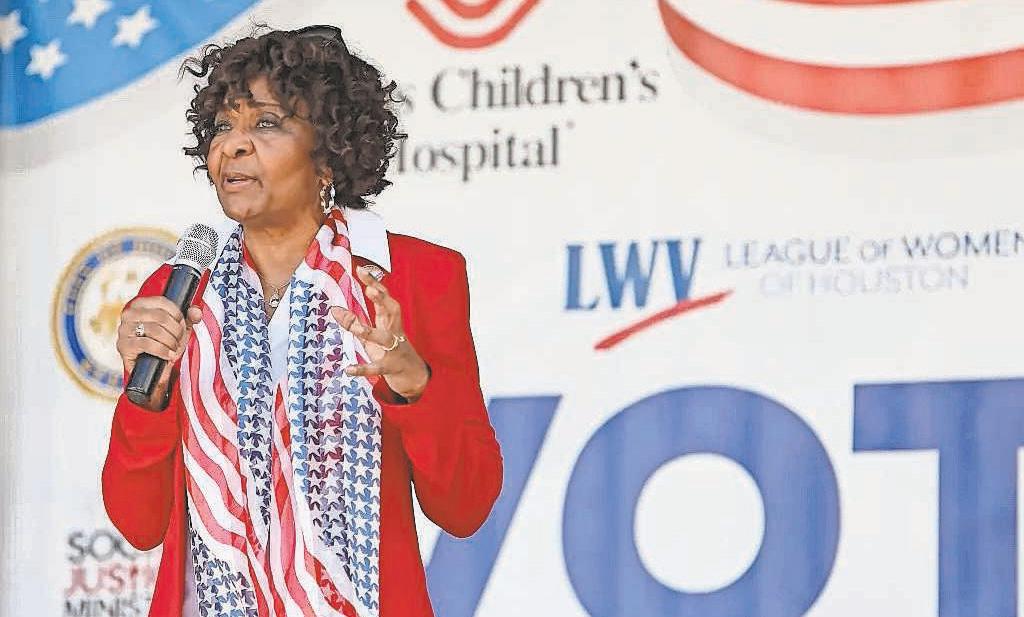 By ReShonda Tate
By ReShonda Tate
For Annie Benifield, voting is in her blood. Her father was a first generation born out of slavery African American, who lived to be 90 years old and never missed an opportunity to vote once he was given the right. Her father passed in 2004, but his dedication has served as fuel to her fire to make voting a priority in her life.
Now, as the first woman of color to lead the League of Women Voters of Houston, Benifield works overtime to get as many people as possible to the polls. She talked with the Defender about her efforts.
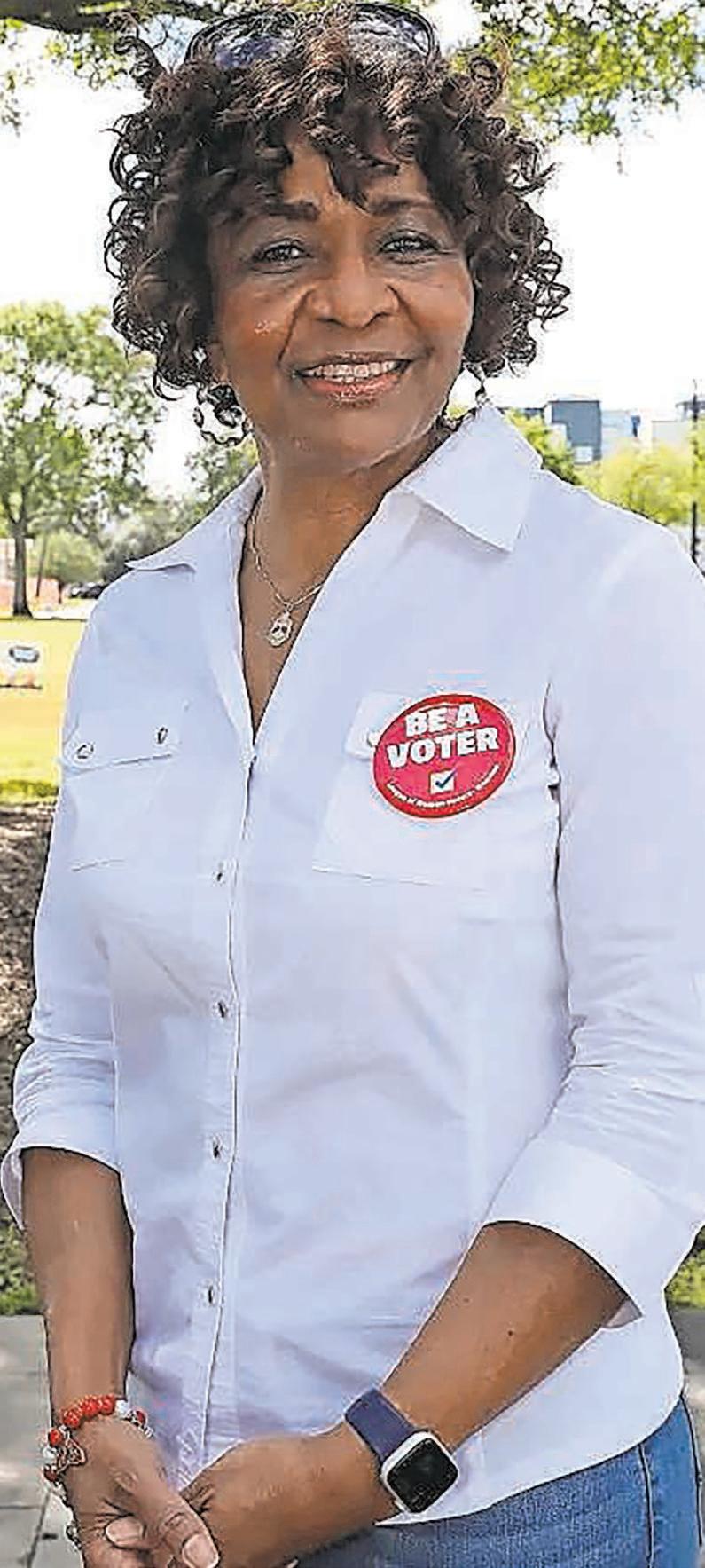
Defender: The League of Women Voters of Houston is a nonpartisan organization that believes in the power of every person to create a more perfect democracy. As the first Black woman to lead the organization, why is this something that’s immensely important to you?
Annie Benifield: Voting rights is not a partisan issue. It’s critical that people get to participate in the political process in a democracy. e expectation is that citizens get to weigh in and engage. And one way they can do that is by the ballot. So this is not partisan, this is just affirmation of the democratic process. My parents didn’t get a chance to cast a ballot until they were a half a century old. Do we want our children not to experience that process? So I’m trying to make sure that I do everything that I possibly can do as president of the League of Women Voters to ensure registration, then engagement, education and empowerment.
Defender: What do you say to people who usually don’t pay as much attention to midterm elections?
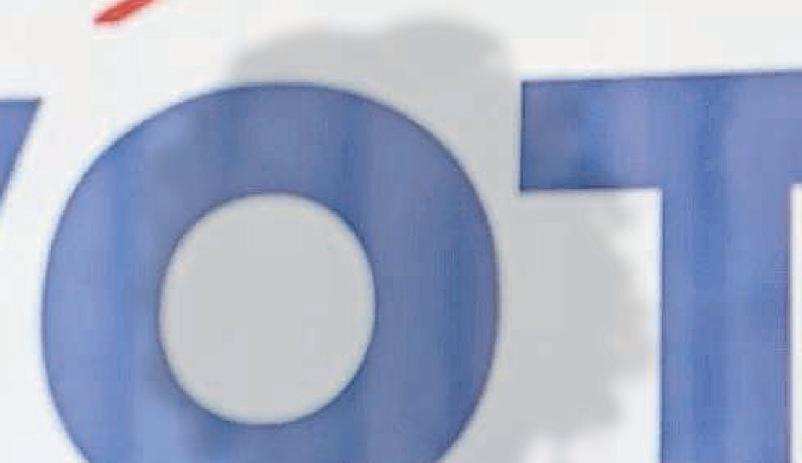
Benifield: All elections are important, but this election is particularly important because the direction of the state and nation is dependent upon what happens in the midterm election. Some of the most populated states have gubernatorial candidates on the ballot. And that could totally change the tide in terms of how things are going and where things are going.
Defender: You have an amazing energy when it comes to talking about voting. What is it that drives you?
Benifield: I want people to get energized about the election and be excited because democracy is not a spectator sport where people get to come and sit in the bleachers and just watch events as they unfold. It’s a gladiator sport, where you get engaged and get involved and fight for what you believe in, such as voting rights, equality, and justice.
Defender: Your efforts go beyond voter registration, and you’re vocal about that being only half the battle.
Benefiel: Voter empowerment comes out of voter registration, but the second aspect of that is voter education, engagement, which comes as a direct result of participating in the political process, casting a ballot, meaning that you have a say of what happens in your society. Every citizen, irrespective of whatever race, creed, nationality or whatever, should have an opportunity to have a say. at doesn’t mean you’re going to win every time, that doesn’t mean your candidate is going to win or the policy you voted for is going to be the prevailing sentiment in terms of the majority. But at least you had a say in terms of what happens in your community. You get to choose your political leaders. Your political leaders should
not get to choose their voters.
Defender: What do you say to the apathetic voter who is just like, ‘My vote really doesn’t matter’ or ‘all the candidates are the same.’
Benifield: When you talk about communities of color, you are here as a direct result of your ancestors being captured, held in dungeons, the transatlantic voyage, slavery, segregation, and lynching. You have a responsibility and obligation to honor what they fought so hard for. It’s important that you show people that you are engaged, vested in your community. at you want to see fundamental change take place. is is the community that we can have an impact on. So voting is a fundamental right. Democracy requires each of us to step up to the plate. I think President Obama said a long time ago that if you’re not at the table, you are on the menu. And so we have to show that we are not on the menu, that we are at the table, we are engaging, and we are responding to what’s happening in our community.




A contingent of local leaders and activists have added their voices to the national call for the passing of the CROWN Act, a piece of legislation that seeks to put an end to hair discrimination which is predominantly, but not exclusively, experienced by Black women.

When the state of Massachusetts passed the CROWN Act in July, the total number
of states in America that passed the anti-hair discrimination legislation stood at 18. at means 32 states (including Texas) still have business and school policies protected by law that allow employers, public school officials, realtors and others to declare Afros, braids, twists and locs “unprofessional” and refuse services, employment and school attendance (including class, graduation ceremonies and
extra-curricular activities) to the wearers of those hairstyles.
The CROWN Act, which stands for “Creating a Respectful and Open World for Natural Hair,” was created in 2019 by Dove and the CROWN Coalition in partnership with State Sen. Holly J. Mitchell of California to ensure protection against discrimination against race-based hairstyles

(i.e. braids, locs, twists and knots).

Recently, a statewide conversation took place on the CROWN Act and what’s happening to force Texas to see the light.
• According to research, Black women are 1½ times more likely to be sent home from the workplace because of their hair.

• Black girls o en experience hair-based discrimination as early as 5 years of age; around the time they are first enrolled in school.
• Black women are 80% more likely to change their hair in order to comply with the office structure
• Forty-five percent of Black girls ages 5-18 in academic environments report

experiencing hair bias and discrimination; an all too frequent happening Black families and communities rarely discuss.
• Fifty-three percent of Black mothers whose daughters have experienced hair discrimination say their daughters have experienced it as early as 5 years old.

• Forty-seven percent of Black mothers report having experienced discrimination


related to their hair.
• Of the 18 states where the CROWN Act is law, 14 of those are considered Democrat-led and three are Republican-led (Louisiana, Nebraska, Tennessee)
• California was the first state to pass it in 2019.
• Local governments have also passed ordinances resembling the CROWN Act including Cincinnati, Ohio, Montgomery County, Maryland, Salt Lake City, Utah and most recently Austin, Texas stepped forward as the first municipality in Texas to pass the CROWN Act.
• On the federal scene, the US House of Representatives passed a federal version of the CROWN Act in March, but it remains stalled in the Senate.
e “CROWN Act Conversation” panel, sponsored by the North Harris County Alumni Chapter of Delta Sigma eta and the National Coalition of 100 Black Women Houston Metropolitan Chapter (NC100BW), included Jenell Berry, president NC100BW who provided the stats (above); Sharon Watkins Jones, chief equity officer and director of Texas Racial Equity Collaborative for Children At Risk; State Rep. Ron Reynolds; and Jeri Brooks, entrepreneur, lobbyist and founder of One World Strategy Group LLC.
Sharon Watkins Jones: In Texas, we’ve had a couple of highly publicized incidents of hair discrimination. One: DeAndre Arnold in Barbers Hill ISD in Mount Belvieu, which is pretty close to Houston. He was not allowed to participate in graduation or prom because he would not cut his locs. Two: In the workplace, in Dallas, Daquerry Davis had his hair in long braids as was his family tradition for generations of men. ey were pulled back. ey were neat. He was an employee with Dallas Area Rapid Transit. He was put on paid administrative leave for almost a year because he would not get rid of his long braids.
Jones: What we see is that hair discrimination takes children out of the classroom; it contributes to the disciplinary actions which are part of the school-to-prison pipeline; it also takes people out of the workplace and hurts the Texas economy. when you are removing people from the workplace and when you’re removing students from getting their education you’re limiting the pipeline of folks into the workforce because they’re not getting everything that they need. So, Texas can’t move forward if we’re discriminating against any Texans.
In May 2021, time ran out for the CROWN Act on a statewide basis. e Texas House worked right up to its midnight deadline passing bills but didn’t get to the anti-hair discrimination bill. House Bill 392, the Creating a Respectful and Open World for Natural Hair Act (CROWN Act) by State Rep. Rhetta Andrews Bowers (D-Garland), would have banned educational, employment and housing discrimination on the basis of hair texture or style, including braids, locs and twists.
Jones: ere is bipartisan support for the CROWN Act, and it can be passed in a state that is red-ish, purple-ish as Texas is now.
Reynolds: We need other states to get on board. We need Texans to lead. But really, we need a national Congress to act so that it’s enacted in all 50 states, so no matter where you live and no matter what state you move to, you’re protected federally. Just like the civil rights law, it protects people on the basis of their race and their gender, we need legislation to be amended so that it protects people also on the basis of their hair texture so that no longer will we continue to discriminate. is is a very pressing conversation. And we need to get more states, not just the 18, and the City of Houston. We need to be challenging the city. Austin led. Why don’t the City of Houston and others pass ordinances to build momentum? We don’t need to wait until the next legislative session.
Jeri Brooks: e CROWN Act isn’t just about African Americans and people of color, although I think we probably experience this more frequently than other groups. It’s not only just about the economy, it’s about self-esteem for all Texas children. It’s about having a safe work environment where right now a er COVID I think many of us have seen it’s been very challenging to bring people back into the workforce to hire up. And when you have all these impediments to having a safe and good work environment it does not make it easier for employers to bring people back.
You can join the movement to make the CROWN Act a national reality. at movement is being spearheaded online at www. thecrownact.com.
Step one: Email your state senator. e website offers a ready-made letter that you can sign and send. Still, it wouldn’t hurt to call your state senator, as well. According to several national, state-level and city elected officials, few things get lawmakers moving as fast as a barrage of phone calls.
Step two: Sign a petition calling for passage of the CROWN Act.
 By Laura Onyeneho
By Laura Onyeneho
Many public schools are building momentum for healthy school meals nationwide. School meals are critical to a student’s health and well-being, espe cially for low-income students. Research shows that school meals help reduce obesity rates, overall poor health and food insecurity, and are associated with the improvement of grades and standardized test scores.
Tis topic has been a part of a larger conversation in com munities and government. Te Biden administration says it is committed to ending hunger in the United States by 2030, making healthy school meals available, and supporting schools that pioneer new ways to improve nutritional quality.
During the COVID-19 pandemic, schools ofered free lunch all year round through pandemic-era federal waivers. Now, many schools are reverting back to parents flling out applications to qualify for free or reduced lunch, which can cause a fnancial strain for economically disad vantaged families.
Recently, schools nationwide joined in on National School Lunch Week from, celebrating the critical role that school lunches play in providing children with

the nutrition they need to learn and thrive.
Te Defender spoke with Dr. Jessiica Howell, Ph.D., director of Child Nutrition for YES Prep Public Schools, about making nutrition a priority at school and in the home.
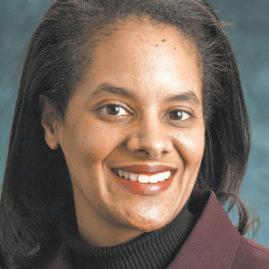
Defender: What are your responsibilities as director of Child Nutrition at YES Prep?
Jessiica Howell: As a child nutrition director, I basi cally say I have 18,000 kids that I have to feed. We are respon sible for making sure that the children are fed when they are on school property each day. Making sure what we are feeding them is in line with the USDA’s regulations as well as the state’s regulations. Making sure the parents understand those roles, making sure any allergies that students may have are also notated and accommodated for with medical statements.
Defender: Many schools are building of lessons learned during the pan demic when waivers allowed schools to serve free meals to all. Now, most states are reverting back to pre-pandemic operations. How has that impacted families and children?
Howell: We as child nutrition profes sionals have been bracing for this as the pandemic is starting to wane a bit. We knew that in the beginning of last year we had to start making some strides with the federal government so that all states can continue these fexibilities. I went to Washington in March to be a part of a Texas delegation to advocate to get these waivers in. Tat particular bill didn’t pass at the time. We did get another senator who put another bill on the table for the Keep the Kids Fed Act. And that’s what did pass.
Te diference was that it didn’t allow all students to continue to eat for free. Many districts had to revamp their system of feeding students, whether that was to
change what was on the menu, informing parents about changes so that parents could be prepared fnancially to send meals with their students to school.
Our students and our schools are in areas that are economically disadvan taged. It was going to be a lot tougher for them. We have a 92% economically disadvantage rate with most of our stu dents in the district, which means these students will either take free or reduced. It’s a big financial strain on parents. At Yes Prep, we pay for any of the paid stu dents and cover the difference of students who have reduced lunches.
Howell: Find the fun in it. Start easy with fruits and vegetables. Introduce something different when you’re pre paring dishes and see how they like it. If you have picky eaters, most little ones like pancakes. They won’t know if it’s a whole grain pancake or not. Add blueberries for the eyes, and use strawberries for the smile. For the older children, start cook ing together or find something healthy at the grocery store you can try. Always be supportive when addressing their eating habit. Help them set specific goals and encourage them.
Power a house full of connected devices with even faster internet speeds from Xfnity. And, Xfnity Mobile is the fastest mobile service with 5G and millions of WiFi hotspots.

you get "can't
and on the go. You can even save up to $600 a year on your
bill.
internet, the
savings? Can’t argue with the facts.
Restrictions apply. Ends 11/20/22. Not available in all areas. New Xfnity Internet residential customers only. Ofer requires enrollment in both automatic payments and paperless billing with stored bank account. Without enrollment, the monthly service charge automatically increases by $10 (or $5 if enrolling with credit or debit card information). The discount will appear on your bill within 45 days of enrolling in automatic payments and paperless billing. If either automatic payments or paperless billing are subsequently cancelled, the $10 monthly discount will be removed automatically. Limited to Gigabit Extra Internet with xFi Complete for 24 months. All other equipment, installation, taxes & fees extra, and subj. to change during and afer promo. Afer 24 months, or if any service is cancelled or downgraded, regular charges apply to all services and devices. Service limited to a single outlet. May not be combined with other ofers. Internet: Actual speeds vary and not guaranteed. For factors afecting speed visit www.xfnity.com/networkmanagement. Mobile: Xfnity Mobile requires residential post-pay Xfnity Internet. Line limitations may apply. Equip., intl. and roaming charges, taxes and fees, including reg. recovery fees, and other charges extra, and subj. to change. Pricing subject to change. In times of congestion, your data may be temporarily slower than other trafc. Afer 20 GB monthly data use, speeds reduced to a maximum of 1.5 Mbps download/750
Even before the pandemic hit, the greater Houston area was home to far too many fam ilies dealing with a serious lack of food on a daily basis.
Te problem continues, but don’t dismiss the impact the We Are One Mobile Food Pantry, a weekly food giveaway efort, has had on pushing back on area food insecurity. Te efort is led by Richard Andrews, founder of the Foundation for Black Heritage and Cul ture, the organization that sponsors the city’s annual Black Heritage Fest.
“Te food pantry efort was born in 2020 right after we held our 5th Annual Black Heritage Fest and COVID really took hold in the city of Houston, and we wanted to do something that really impacted the Houston community,” said Andrews. “And what better way to impact the community than to distrib ute fresh food, fruits and vegetables.”
According to a 2020 survey by the Food Research and Action Center (FRAC), 13.9%
of the Houston/Harris County population reported being food insecure (lacking reliable access to a sufcient quantity of afordable, nutritious food). And children sufered most, as nearly 1 in 4 youth under the age of 18 in Houston/Harris County were food insecure.
Tose 2020 numbers were part of a nineyear downward trend, meaning from 2011 to early 2020, the Houston area saw a lower percentage of its residents as food insecure. Ten came COVID-19.
During the pandemic, the number of Tex ans who “didn’t have enough to eat” in a oneweek period soared to over three million in July of 2020.
Amazingly, however, those numbers dropped to just over 1.5 million by August of 2021, according to U.S. Census Household Pulse data analyzed by the report, in large part because of increased federal spending on the Supplemental Nutrition Assistance Program (SNAP).
Andrews said to bring his vision to life, he and his team reached out to any and everybody, including multiple Houston City Council mem bers, Mayor Sylvester Turner’s ofce, the Hous ton Food Bank, Shrine of the Black Madonna Cultural and Events Center and others.
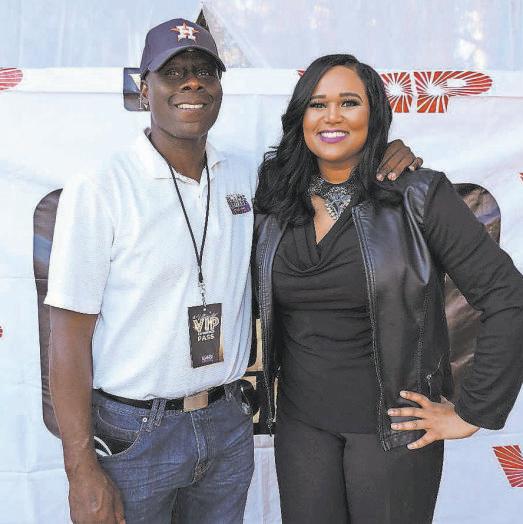
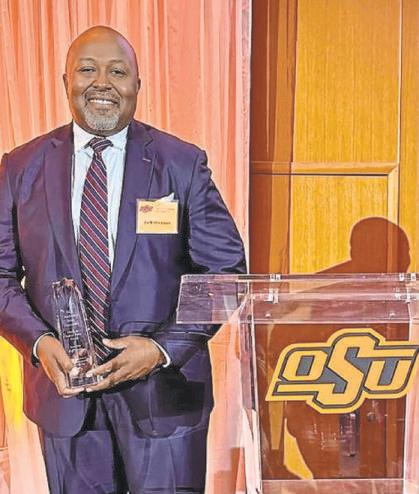
“It is a collaborative partnership to host this food giveaway each and every Saturday from 11 a.m. to 2 p.m.,” said Andrews.
Andrews has been able to unite other elected ofcials, community organizations, activists and corporate partners to this efort to stem food insecurity.
“Partners, we have so many, including Feed
the Children, VIP Media, Councilmember Carolyn Evans Shabazz, U.S. Congresswoman Sheila Jackson Lee, U.S. Congresswoman Sylvia Garcia, Target, H-E-B and so many others,” he said.
And it’s a good thing, because fighting hunger requires an “all-hands-on-deck” efort.
The FRAC survey found that one in four Americans (25%) worry about having enough money to put food on the table in the next year. Tis is especially troubling when you consider that food insecurity is associ ated with chronic health problems in adults, including diabetes, heart disease, high blood pressure, hyperlipidemia, obesity and men tal health issues including major depression. And as social workers regularly report, when parents are doing bad, the negative impacts are magnifed upon their children.
A 2021 report by Hunger Free America found that, from 2018 to 2020, an average 4,112,002 Texas residents lived in food-in secure homes, meaning they were unable to always aford an adequate supply of food,
according to USDA data.
But what about the Bayou City? Recently, the City of Houston launched a new initia tive to battle food deserts in the area — 100 Pantries in 100 Days, led by Houston City Councilmember Edward Pollard (District J) with the hopes of combating food insecurity in Houston. Te city’s food insecurity rate is 4% higher than the national average.
In plain numbers, that means more than 738,000 of Houston’s 2.3 million residents exist with no access to healthy food and 360,000 children are experiencing food inse curity. And the numbers are larger when you consider all of Harris County.
Te We Are One efort has tremendous meaning to the 600 families per week that received a large portion of their food from the initiative’s set-up in front of the Shrine of the Black Madonna’s sanctuary at 5309 MLK Blvd.
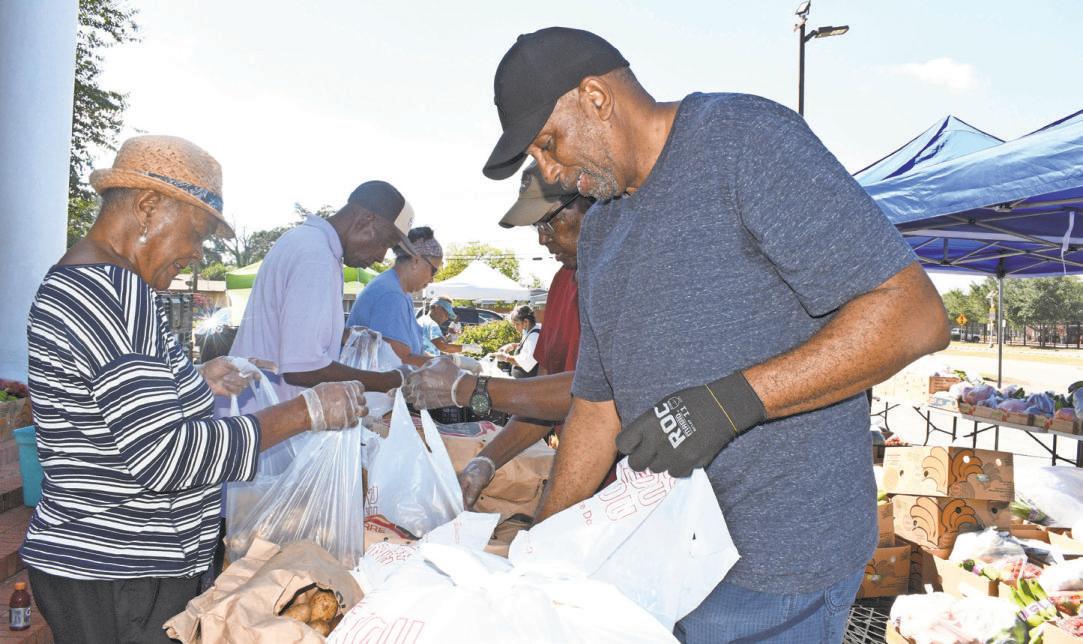
For more information, email ra@houston blackheritagefest.com, visit www.houstonblack heritagefest.com.
The HARRIS CENTER For Mental Health and IDD (formally known as Mental Health Mental Retardation Authority of Harris County) will be accepting Request for Proposal for the following: INSURANCE AGENT OF RECORD SERVICES FOR PROPERTY AND CASUALTY INSURANCE
Specifcations may be secured from The HARRIS CENTER, Purchasing Department located at 9401 SW Freeway, Houston, Texas 77074; telephone (713) 970-7116 and/or via The HARRIS CENTER website www.theharriscenter.org or the Electronic State Business Daily Site https://portal.cpa.state.tx.us/ beginning Tuesday, November 1, 2022. Deadline for prospective vendors to submit questions to this RFP is Tuesday, November 8, 2022. Solicitation documents must be submitted to Purchasing Services, 9401 SW Freeway, Houston, Texas 77074 by 11:00 A.M., Tuesday, December 6, 2022, in a sealed envelope marked “RFP FOR AGENT INSURANCE OF RECORD SERVICES FOR PROPERTY AND CASUALTY INSURANCE” - DO NOT OPEN UNTIL – TUESDAY, DECEMBER 6, 2022, AT 11:00 A.M. Any questions pertaining to this solicitation should be addressed in writing to James Blunt, Buyer II or E-mail questions to james.blunt@theharriscenter.org cc: sharon.brauner@theharriscenter.org., or via fax at (713) 970-7682. Historically Underutilized Businesses, including Minority-Owned Businesses and Women-Owned Businesses, are encouraged to participate. The HARRIS CENTER reserves all rights to reject any and/or all proposals, to waive formalities and reasonable irregularities in submitted documents as it deems to be in its best interests and is not obligated to accept the lowest proposal.
Jef
In a decision that was widely expected, a Russian court has denied the appeal of impris oned U.S. basketball star Brittney Griner.
Te Hail Mary appeal attempt was the last legal option the Houston native and WNBA star had at getting her nine-year prison term over turned afer she was sentenced in August for being caught with one gram of cannabis oil in her luggage at a Moscow airport this past Febru ary. Griner, who was attempting to return to the U.S. afer spending her WNBA ofseason play ing in Russia, said she inadvertently packed the oil in haste. She said it was an honest mistake.
Now, the only chance of Griner returning home anytime soon will be a negotiated deal between the U.S. and Russia.
Griner and her attorneys unsuccessfully attempted to argue Tuesday that the penalty was excessive and unprecedented for the small amount of drugs apprehended at the airport.
Griner, who was not present at the hearing but participated by video call, pleaded for her release and said that it was traumatic being away from her family.
But none of that mattered as the appeal was fat rejected by the Russian court.
Griner’s Russian attorneys told the appeals court that the imprisonment has taken a toll on the basketball star. She has been in a pre-trial detention center since her arrest, but she is set to now go to a penal colony where the conditions will be much worse.

“Brittney is very mentally strong and has a champion’s character,” her attorneys said. “How ever, she of course has her highs and lows as she is under an increasing amount of stress and has been separated from her loved ones.”
Griner’s imprisonment has always seemed more political than about the actual crime and her legal process has been described as theater due to the frosty relationship between the U.S. and Russia. Currently, the U.S. and Russia are at odds over President Vladimir Putin’s invasion of Ukraine.
U.S. ofcials have called Griner’s sentence a miscarriage of justice and she is considered wrongfully detained.
President Biden and the U.S. Justice Depart ment are believed to be working behind the
scenes to get Griner and fellow American Paul Whelan released through negotiations. Rus sia is said to want the U.S. to release Russian arms dealer Viktor Bout, who is known as the
Merchant of Death, from his 25-year prison sentence in return for Griner and Whelan.
It’s unclear where the negotiations for her release stand at this point.
PVAMU had three 100-yard rushers in win over Lamar The Prairie View Panthers took a ground-andgrind approach in dominating the Lamar Cardinals 54-21 on the road last weekend. PVAMU had three runners rush for 100 yards, including running back Jaden Stewart with 141 yards and one touchdown on just nine carries. Quarterback Trazon Connley also had a spectacular outing on the ground, rushing for 119 yards and three touchdowns on 12 carries and Ahmad Antoine produced 100 yards and a touchdown on the ground. In total, the Panthers amassed 401 yards rushing on just 37 carries for the game.

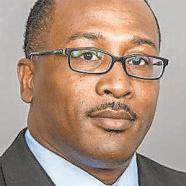

TSU spoils another homecoming Just call the Texas Southern Tigers the homecoming crashers. The Tigers defeated Alcorn State 34-27 over the weekend, marking the first time in 11 years they came out victorious over the Braves. It also marks the second time this season the Tigers have gone on the road and defeated an opponent during its homecoming festivities. TSU, which is 3-4 overall and 3-2 in SWAC play, is off to its best start since 2016. The Tigers return home to face Lincoln University for their homecoming on Saturday.
Former Roughnecks QB turns heads in NFL Phillip Walker, former quarterback of the now-defunct Houston Roughnecks of the XFL once had trouble holding an NFL job but now may be the toast of the league. Walker, a third-stringer for the Carolina Panthers, got his shot last weekend and delivered a 21-3 win over Tom Brady and the Tampa Bay Buccaneers. Walker completed 16 of 22 passes for 177 yards and two touchdowns during the upset win.


Dusty Baker smiled as only he seems to be able to and his team began a celebration that started Sunday night and spilled into the morning.
e Astros are headed back to the World Series.
Actually, let’s amend that. e Astros are headed back to the World Series for the second straight year. And as great of a collective talent as the Astros are right now, none of this could have been possible without the man smiling in the middle of the celebration following the 4-0 sweep of the Yankees in the American League Championship Series.
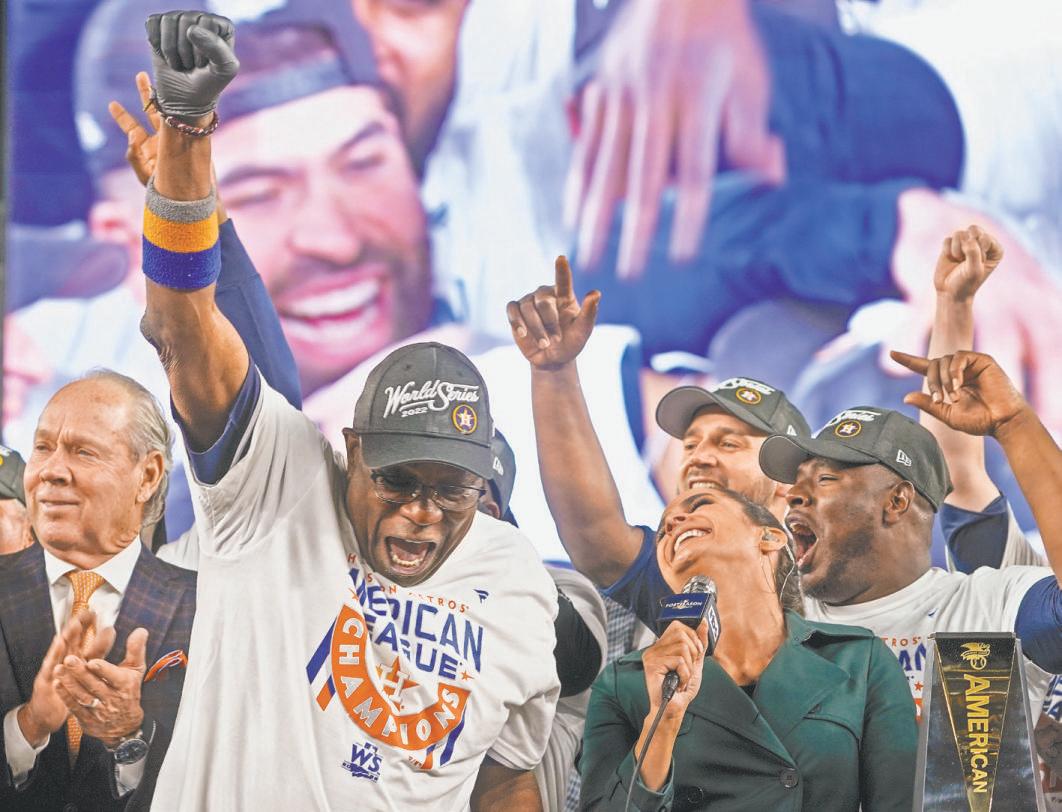
At a time when the Astros dynasty could have crumbled prematurely in wake of the 2017 sign-stealing scandal, Baker stoically stepped in as manager and the American League dominance has continued.
Now it’s time for Baker and the Astros to complete the job. And that starts in earnest on Friday when they host the National League champs Philadelphia Phillies in Game 1 of the Fall Classic at Minute Maid Park.
It’s been a challenging trek for Baker and the Astros, but it’s been one they have seemed destined for.
“It’s a long road to get here,” Baker said. “ ere’s a lot that happens in the months to get here from Spring Training. It means that we persevered and we stayed together, and we made the necessary trades when we had to try to strengthen certain parts of our team. ese guys are a very close-knit bunch of guys.”
The closeness that is felt in the Astros clubhouse is all a reflection of the team’s manager. Baker, who has been class personified since he was first written into a Major League Baseball lineup card at the age of 19 in 1968, returned a dignity to the franchise when it was all about to fall apart before he came aboard prior to the 2020 season.
Fingers were being pointed in the clubhouse and the manager and general manager had been fired in wake of the sign-stealing scandal that tainted the Astros’ World Series title in 2017. But Baker, undoubtedly one of the best baseball men out there, came in and held it together by just being himself.
His players recognize what his presence and baseball knowledge did in righting the ship and as a result they seem more committed than ever to giving Baker the one thing
that has eluded him in his illustrious career and that is a World Series title.
“One hundred percent,” Astros third baseman Alex Bregman said of the club’s desire to win this one for Baker. “We love going out there every single day and competing for him. He loves this team. He loves winning. He loves the game of baseball. And 100 percent we want to win for him.”
And make no mistake about it, Baker is as energized for this run as anyone in the Astros’ organization. Don’t let his 73 years of life fool you.
“I stay hungry,” said Baker, who this season became just the 12th manager in AL/NL history to win 2,000 games. “Some people, most people, are rooting for us; some people are rooting against us. It doesn’t matter. at motivates you either way. ere are a lot of positive thoughts coming our way. ere are a ton of positive thoughts and spiritual togetherness in the city of Houston.”
Perhaps more now than ever, the Astros seem poised to win it all. ey are playing dominant baseball in all phases as evidenced by their 7-0 playoff run so far, becoming just the fi h team in MLB history to start the postseason with at least seven straight wins after sweeping the Mariners (3-0) in the ALDS and then taking down the Yankees
in four games.
e toughness the Astros have displayed comes back to the man in charge. He has connected with this club and city in ways that few thought possible when owner Jim Crane hired Baker more for his spotless reputation than for the Hall of Fame managerial career he has put together in 30 years of running clubs.
“He relates to his players,” Justin Verlander said. “I think he takes a lot of pride in that. I think he really tries to get to know everybody individually and understand what makes them tick and try to connect with them on more than just a manager-player-type level, and that goes a long way.”
Baker has now led the Astros to three straight ALCS appearances and back-toback World Series, but amazingly his run in Houston could be four wins or four losses away from ending as he is on an expiring one-year deal as he was last season.
But don’t expect to hear Baker complain.
“I don’t want to be a distraction to my team,” Baker said to reporters at Yankee Stadium. “I’ll let you know at the end of this year.”


And if all goes as planned, he will be letting us know about next year with a World Series Championship trophy in tow.

Wisdom junior outside hitter Jariya Lee is a ball of energy on the volleyball court that is always anticipating her next opportunity to put her team in a position to succeed.

Whether that requires making close-out serves as she did in Wisdom’s 3-1 comeback victory over Northside, or her willingness to sacrifice her body to prevent the other team from scoring, Lee leaves it all on the court.


Wisdom head volleyball coach Bridgette Davis listed what makes Lee so special.
“Her tenacity, her fight, and her drive,” Davis said. “She is a player that will give 110% effort and ignites everyone else.”
As a junior, Lee has become one of the most vocal players on her team, and it is obvious that she takes the responsibility of leadership that is necessary for all team sports.
e Defender spoke with Lee to discuss her style of play, leadership, advice to others and more.




“I
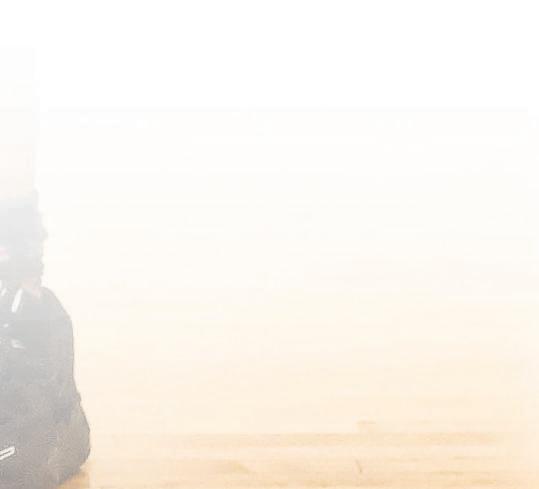




hustle for it. If
else can get it, I can get it. And I

and did not
went for
that
That’s why Google parners with publishers like Texas Metro News, a digital news site serving the Black community in Dallas.

Texas Metro News more than doubled their direct sold and programmatic adverising revenue afer paricipating in our digital development program, one of the many ways we work with local publishers nationwide to build a stronger future for news.

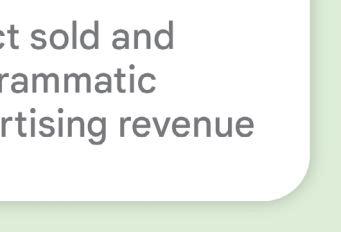

Learn more about how Google suppors local news g.co/supporingnews/local

